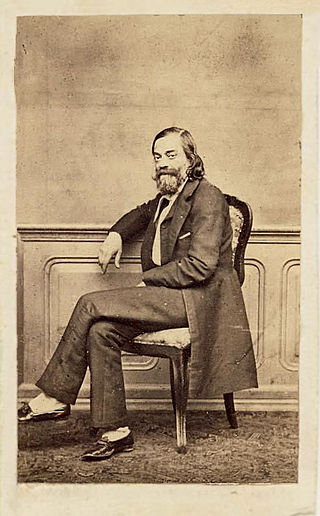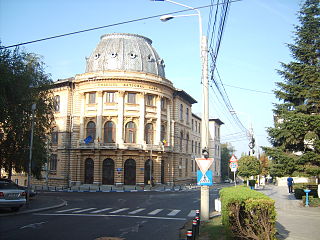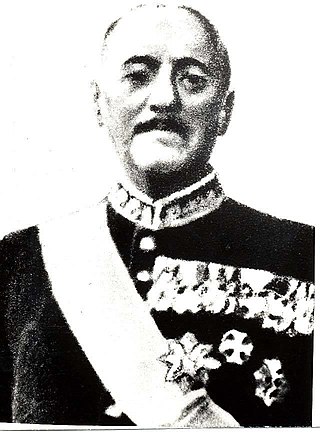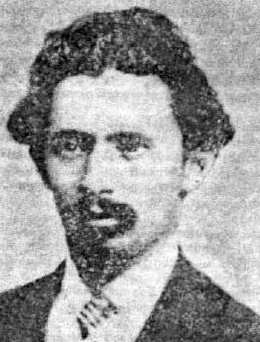Notes
- 1 2 Mihai Sorin Rădulescu, Elita liberală românească, 1866-1900, p. 96. Bucharest, Editura All, 1998. ISBN 978-973-9392-93-8
- 1 2 3 4 (in Romanian) "Racoviță, Nicolae Gr.", at the Alexandru and Aristia Aman County Library
Nicolae Gr. Racoviță (July 17, 1835–March 15 [ O.S. March 3] 1895) was a Wallachian-born Romanian politician.
Born in Craiova, his parents were the high postelnic Grigore Racoviță and his wife Cleopatra Brăiloiu, daughter of high aga Nicolae Brăiloiu. [1] He studied law at the University of Berlin, obtaining a doctorate. After returning home, he worked in the administrative and judiciary systems. [2] A moderate Liberal, Racoviță served as interim Foreign Minister for three days in December 1870. [1] From December 1870 to March 1871, he was Minister of Religious Affairs and Public Instruction in the cabinet of Ion Ghica. From 1876 to 1880, he was president of the Dolj County Council, and was mayor of his native city from 1888 to 1890. [2]
Racoviță was an editor at Alexandru Odobescu's Bucharest-based magazine Revista istorică in 1862. In 1867, 1868 and 1870, he edited the weekly Nepărtinitorul, a poetic and literary journal. He was friends with the Junimea group, and was a talented pianist who composed sonatas. [2]
He was married to Despina Socolescu, the niece of Theodor Aman. Racoviță died in Rome and was buried in Craiova. [2]

Constantin Coandă was a Romanian soldier and politician who served as prime minister of Romania in 1918.

Alexandru G. Golescu was a Romanian politician who served as a Prime Minister of Romania in 1870.

Theodor Aman was a Romanian painter, engraver and art professor. He mostly produced genre and history scenes.

Constantin Alexandru Rosetti was a Romanian literary and political leader, born in Bucharest into the princely Rosetti family.

The Carol I National College is a high school located in central Craiova, Romania, on Ioan Maiorescu Street. It is one of the most prestigious secondary education institutions in Romania. Between 1947 and 1997 it operated under the name of Nicolae Bălcescu High School.

Alexandru Mironov is a Romanian science-fiction writer, journalist, and left-wing politician. A former member of the Social Democratic Party (PSD) and Counsel for President Ion Iliescu, Mironov was Minister for Youth and Sport in 1993-1996. Since 2008, he is a member of the minor Romanian Socialist Party (PSR). He is also known as a radio and television presenter and a documentary filmmaker.

Alexandru Ioan Odobescu was a Romanian author, archaeologist and politician.
Barbu Bălcescu was a Wallachian, later Romanian lawyer and revolutionary, the younger brother of Nicolae Bălcescu.
Nicolae Callimachi-Catargiu was a conservative Romanian politician who served as the Minister of Foreign Affairs in two terms from November 28, 1869, to February 1, 1870, and December 18, 1870, until March 11, 1871, and as a Romanian envoy to London and Paris.

Gheorghe Chițu was a Wallachian, later Romanian lawyer, politician, and man of letters, whose activities were mostly centered on the region of Oltenia. The recipient of a classical education, which compensated for his middle-class background and allowed him to study at the University of Vienna, he was also deeply involved in the Wallachian Revolution of 1848 as an early adherent of "Red" liberalism. He became a propagandist and organizer for the National Party, founding Vocea Oltului gazette in 1857. Chițu was confirmed as the United Principalities' first-ever elected provincial mayor, at Craiova, where he also worked as a lawyer and prosecutor. His political radicalism and his participation in the Romanian Freemasonry were nuanced by his defense of the Romanian Orthodox Church against a reduction of its assets.

Nicolae M. Condiescu was a Romanian novelist and soldier.
Nicolae P. Bănescu was a Romanian historian, elected a titular member of the Romanian Academy in 1936.

Nicolae Chiriac Quintescu was a Wallachian, later Romanian philologist, essayist and translator.
Mihai N. Săulescu was a Romanian jurist and politician.

Anastase Stolojan was a Wallachian-born Romanian politician.

Mihail Oromolu was a Romanian magistrate and politician.
Constantin N. Brăiloiu was a Wallachian and Romanian politician.

Alexandru Barbu Știrbei, also rendered Alex. Știrbeĭ, Știrbey, or Știrbeiŭ, was a Wallachian-born Romanian aristocrat, politician, businessman and agriculturalist, the son of Barbu Dimitrie Știrbei, Prince of Wallachia, younger brother of George Barbu Știrbei, and nephew of another Prince, Gheorghe Bibescu. After a short career in the French Army, he returned to the United Principalities and served terms in their Assembly of Deputies, inheriting the fortune left by his father. He established pioneering industries around his manorial estates of Buftea and Dărmănești, and became a guest, and sometime host, of literary meetings held by the political club Junimea.

The first cabinet of Nicolae Crețulescu was the government of Romania from 24 June 1862 to 11 October 1863.

The third cabinet of Ion Ghica was the government of Romania from 18 December 1867 to 11 March 1871.